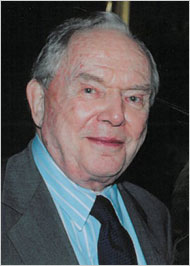Richard Poirier

Richard Poirier, a prolific and populist cultural critic who founded a literary journal, Raritan: A Quarterly Review, and who was a founder of Library of America, the nonprofit publisher of American classics, died in Manhattan on Saturday. He was 83.
---------
Richard Poirier, a prolific and populist cultural critic who founded a literary journal, Raritan: A Quarterly Review, and who was a founder of Library of America, the nonprofit publisher of American classics, died in Manhattan on Saturday. He was 83. The cause was injuries suffered in a fall in his home, said a friend, the poet Frederick Seidel.
His own works were quite ahead of their time, as he was one of the first and most prominent critics to address the cultural relevance and significance of rock 'n' roll during the 60s when most critics denounced it as being nothing but adolescent hogwash that had no importance to evolution of literature or culture. In fact, “Learning From the Beatles,” originally published in Partisan Review in 1967, was among his most famous works.A remarkable essay about the album “Sgt. Pepper’s Lonely Hearts Club Band” that lamented the lack of serious cultural criticism about rock ’n’ roll, it recognized the emergent interaction between “serious” and pop culture and recognized the revolution that the Beatles, their Britishness notwithstanding, had begun to effect in American cultural life.
His books included a literary study, “The Comic Sense of Henry James”; a collection of essays, “The Performing Self,” that argued that artistic creativity is a performance, a self-aware exercise of self-expression in which artists are attempting to liberate themselves from the cultural, moral, political and psychological strictures of society’s expectations; and critical studies of Frost and Mailer that placed them at the forefront of American letters, bravado performers, as it were.
Mr. Poirier, who was a longtime professor of English at Rutgers, founded Raritan, an influential literary journal based there, in 1981. The magazine was an attempt — successful, by most standards — to engage both academics and non-academics “in a conversation about literature and culture,” in the description of T. Jackson Lears, who took over as editor of Raritan in 2002. In its pages could be found the poetry of John Hollander, John Ashbery and Richard Howard, among many others, as well as the work of the many prominent essayists and cultural commentators, including the Palestinian-American writer Edward Said, the literary critic Frank Kermode, the dissident feminist Camille Paglia, the gender-studies theorist Eve Kosovsky Sedgwick, and Vicki Hearne, whose essays and poems explored the consciousness of animals.
Mr. Poirier’s other grand project was Library of America, which he helped found in 1979 as a nonprofit publishing house that would champion the homegrown literature of the United States and pull together the collected works of writers — mostly writers of classics — whose work was previously uncollected. The company has nearly 200 volumes in print, including not only collected works by writers like Melville and Henry James, but also collections of journalism about World War II, the Vietnam War and the civil rights movement.
William Richard Poirier was born in Gloucester, Mass., on Sept. 9, 1925, into a poor “totally non-literary family,” he recalled in an interview with the Rutgers literary magazine Scriblerus. His father was a fisherman. A high school English teacher fostered his interest in reading. After high school, he joined the Army and served in Europe during World War II. Afterwards, on the G.I. bill, he went to Amherst, where Frost was an influential presence, giving readings each semester and talking about poetry to English majors. He subsequently earned an M.A. at Yale, spent time at Cambridge on a Fulbright fellowship and was awarded a Ph.D. at Harvard in 1960.
Mr. Poirier never married. No immediate family members survive.
Source: the New York Times